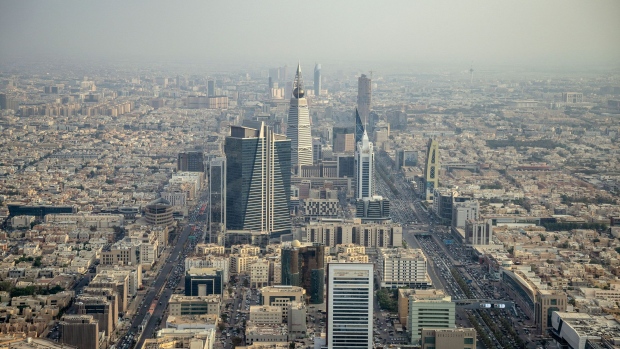Apr 26, 2024
Saudi Capital to Cut Population Goal as City Reviews Strategy
, Bloomberg News

(Bloomberg) -- Saudi Arabia’s capital is set to pull back on its target to double its population by 2030 as it reconfigures plans designed to support Crown Prince Mohammed bin Salman’s multi-trillion dollar agenda to diversify the kingdom’s economy.
Riyadh is eyeing 10 million residents by the start of the next decade, according to people familiar with the matter, who asked not to be identified discussing private information.
The Royal Commission for Riyadh City said the current goal stands at 15 million and that it’s undertaking reviews of the Riyadh City Strategy’s targets and sectors.
Read More: Saudi Arabia Wants Its Capital to Be a Place You’d Want to Live
The move comes as Saudi Arabia, which is working to transform into a new global hub for everything from tourism to metals mining and chip making, reconsiders its top priorities for Vision 2030. The kingdom has been planning for an influx of foreign workers and international tourists that would help the country pull in revenue from a wider range of sectors.
Riyadh’s population is estimated to grow by 1.8% this year to reach more than 7.8 million people and cross 8.5 million in 2030, according to the World Population Review. Saudi Arabia as a whole is home to about 36.5 million residents, World Census Bureau data shows.
The capital city forms the backbone of Saudi Arabia’s non-oil economy as it’s the most populous region and houses international companies including Amazon.com Inc. and Microsoft Corp.
Riyadh is also a major focal point for Saudi Arabia’s transformation as it prepares to host the World Expo in 2030 and possibly the 2034 FIFA World Cup.
Mega projects including the entertainment city of Qiddiya, mixed-use real estate development New Murabba and a metro system are under development as the city works to become more livable and cater to global visitors.
Read More: Saudi Arabia Is Making a High-Risk $1 Trillion Bet on Tourism
Whether all work goes ahead as originally planned is a point of uncertainty.
Finance Minister Mohammed Al-Jadaan has acknowledged a funding shortfall and said there may be delays or acceleration for some projects.
©2024 Bloomberg L.P.

